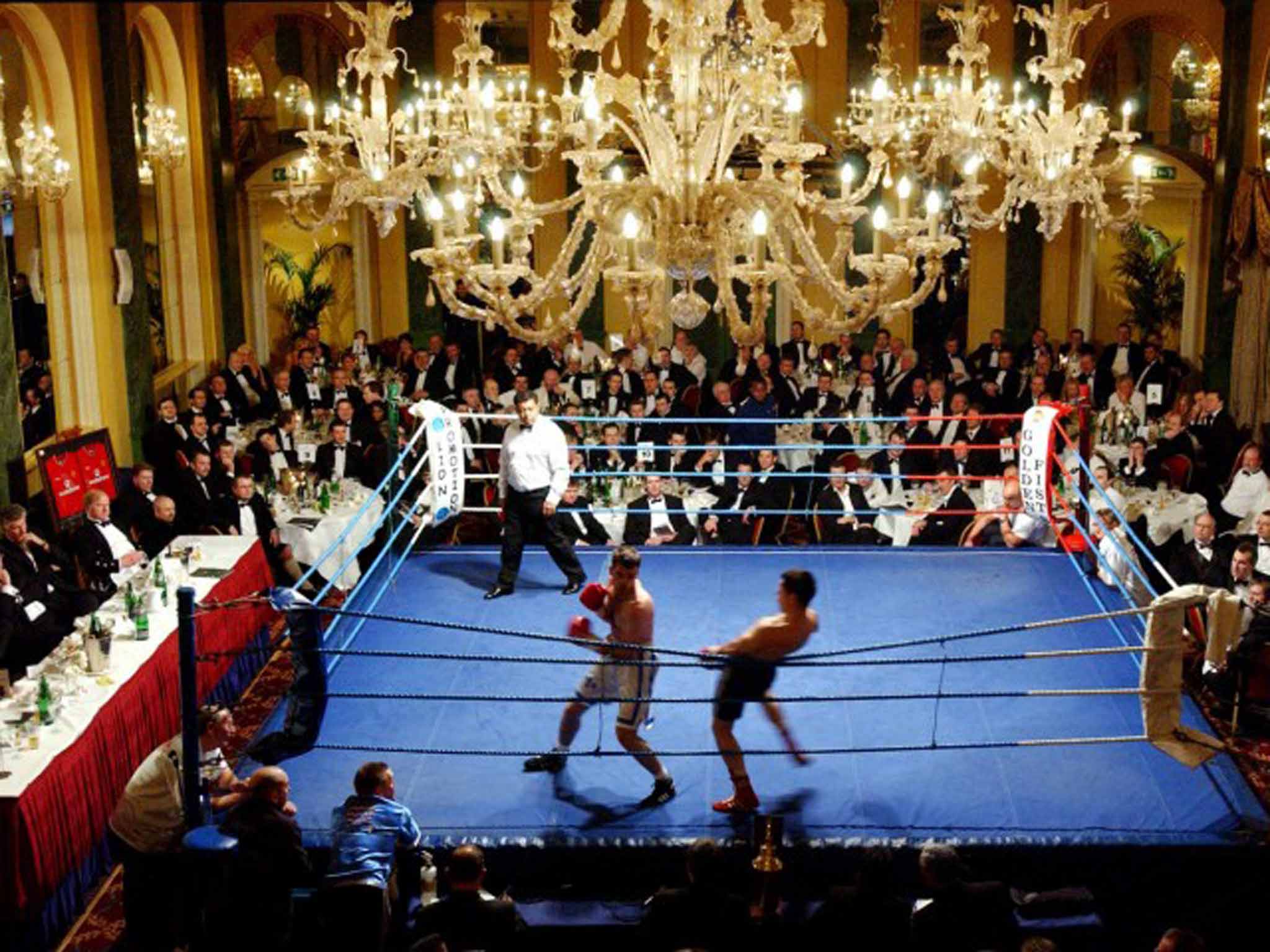The Cafe Royal, home of British boxing, is bringing its ring back in aid of veterans
The Café Royal enjoyed by Oscar Wilde was also where his nemesis wrote the rules of British boxing. Tomorrow fists will fly there again in aid of injured fighters

Your support helps us to tell the story
From reproductive rights to climate change to Big Tech, The Independent is on the ground when the story is developing. Whether it's investigating the financials of Elon Musk's pro-Trump PAC or producing our latest documentary, 'The A Word', which shines a light on the American women fighting for reproductive rights, we know how important it is to parse out the facts from the messaging.
At such a critical moment in US history, we need reporters on the ground. Your donation allows us to keep sending journalists to speak to both sides of the story.
The Independent is trusted by Americans across the entire political spectrum. And unlike many other quality news outlets, we choose not to lock Americans out of our reporting and analysis with paywalls. We believe quality journalism should be available to everyone, paid for by those who can afford it.
Your support makes all the difference.Whether seated amid all the chandeliers, caryatids and chintz tablecloths of the ballroom or settled around the brightly lit board table of a rather more modern business suite, one might think the average visitor to London's Café Royal hotel would be unlikely to welcome the sound of fists smacking into jaws, nor the plash sportsmen's sweat landing at their feet. Yet this evening, the venerable hotel where Oscar and his beloved Bosie once swapped quips will be filled with both pugilists and perspiration as one of its function rooms is transformed into a boxing ring.
It's part of the Café Royal's 150th anniversary celebrations, and said ring will be surrounded by tables for spectators watching the best of the Royal Marines Boxing Association slugging it out over four separate bouts. (For guests who prefer their supper without close-ups of knuckle sandwiches there will be seating in the gallery, which will allow for a loftier and altogether less visceral viewpoint). The evening, which will also include an auction attended by VIPs from the sports, entertainment and music industries, aims to raise funds for the Royal Marines Charity, supporting comrades returning from battle with life-changing injuries.
Despite first appearances, the setting couldn't be more apt. Boxing and the Café Royal have always been hand in glove. In 1951, it became the home of the National Sporting Club, regularly holding black-tie dinners before boxing bouts. The founding members of the club – and arguably the creators of modern boxing – Hugh Cecil Lowther, the Fifth Earl of Lonsdale, and John Sholto Douglas, the ninth Marquess of Queensberry, were regular visitors and laid down the famous Queensberry Rules for Boxing there in 1867. (Twenty-eight years later, the marquess – who was Bosie's father – would write to the “posing somdomite” [sic] Wilde, and set in train the writer's destruction.)
It shouldn't come as a surprise that the well-to-do and the working class came together in their appreciation of a good scrap, says boxing historian Miles Templeton. “While the boxers tended to come from Britain's working classes and the promoters and managers were often middle-class businessmen with some money to throw at the game, the senior administrators and many of those at ringside came from public schools and the higher echelons of society, including stockbrokers, the landed gentry and royalty.”
Over the years, the dinners and bouts attracted a host of famous fighters – Muhammad Ali, Frank Bruno and Henry Cooper, to name just a few – cementing the hotel's position in boxing history. But the original ring, still carrying the visual reminders of its long and bloody past, was auctioned off in early 2012 when the hotel passed into new ownership and extensive renovations began. So why resurrect it now?
“Having been such a key part of boxing history, with the modern-day rules of boxing having been written here, we feel this is the perfect way to celebrating the Café Royal's history,” says Anthony Lee, general manager of the hotel. The Café Royal's sporting pedigree extends beyond the ring, too. In May 1903, a group of young men met in the hotel and decided to found an organisation to promote the sport of skiing within Britain. Thus the Ski Club of Great Britain was born – and more than 100 years later, it has upwards of 29,000 members; until the 1960s, it was responsible for Britain's Alpine racing teams.
Tonight, the Royal Marines Charity aims to raise at least £2.5m a year to provide continued support for wounded, sick and injured Marines and their families. And regardless of which fighter comes out triumphant, one thing is certain: punch is on the menu.
Join our commenting forum
Join thought-provoking conversations, follow other Independent readers and see their replies
Comments